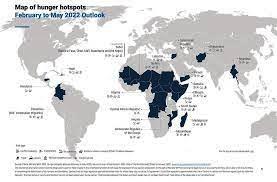 The impending food crisis that will impact nations with deficient domestic production will become evident during the second half of this year. Food insecurity was a dominating theme at the April meeting of finance ministers including representation from the International Monetary Fund and the World Bank. The need to deliver food to needy populations is more urgent after the Russian invasion of Ukraine and disruptions of Black Sea shipping.
The impending food crisis that will impact nations with deficient domestic production will become evident during the second half of this year. Food insecurity was a dominating theme at the April meeting of finance ministers including representation from the International Monetary Fund and the World Bank. The need to deliver food to needy populations is more urgent after the Russian invasion of Ukraine and disruptions of Black Sea shipping.
The U.S. delegation led by secretary of the treasury Janet Yellen proposed practical preemptive measures including revocation of export restrictions, abolishing price controls and subsidizing production in developing nations. The World Bank will provide $17 billion over the next two years to improve food supplies especially in middle-income nations. It is estimated that malnutrition could affect as many as 15 million in 2023 and the situation may deteriorate further unless the war in Ukraine is ended.
The fact that Russia and Ukraine collectively are responsible for supplying wheat to Middle East and North African nations among others creates concern for regional stability. Nations relying on supplies from Eastern Europe are having difficulty in substituting alternative suppliers over the short. Production costs in North American and the E.U. move sharply upwards following increases in the prices of energy, fertilizer and transport.

CoBank with an involvement in agriculture in the U.S. predicts higher commodity prices driven by energy that will persist through 2023 and will threaten a recession. The World will be more reliant on efficient agricultural nations including Brazil, the U.S. and Canada for grains, oilseed and animal protein.
Concern over global warming and environmental degradation will take a back seat in the short term to optimizing food production, irrespective of the ultimate costs. Eventually industrialized nations will have resume progress in substitution of energy derived from fossil fuel. Solar, wind and nuclear power generation require additional capital investment and government support. Unrealistic restrictions on productivity must be deferred until the present crisis is resolved.